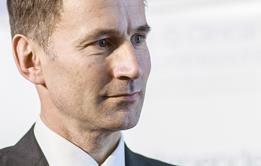When Jeremy Hunt was made health secretary three years ago, the appointment was seen by many as a triumph of style over substance.
When Jeremy Hunt was made health secretary three years ago, the appointment was seen by many as a triumph of style over substance.
Andrew Lansley’s NHS reforms had wrought chaos, burned away Conservative political capital, and proven that a secretary of state with deep subject knowledge isn’t necessarily desirable.
‘Mr Hunt, people said, was the anti-Lansley: a polished communicator’
Mr Hunt, people said, was the anti-Lansley: a polished communicator there primarily to save the Tories from more bad NHS headlines prior to the election.
His post-Francis focus on patient safety fits easily within this narrative, as a tactic for shifting media attention away from the unpopular Health Act 2012 and onto care failures within the health service.
Jeremy Hunt interview
Unfair characterisation
But this early characterisation was unfair. Counter to those who said Mr Hunt wouldn’t be around past the election, he has become one of history’s longest serving health secretaries.
And his policy thinking – while not always right – has proven developed and internally coherent.
A case in point is his assertion, in this week’s exclusive HSJ interview, that high Care Quality Commission ratings will replace foundation trust status as NHS providers’ “single definition of success”.
‘It’s a model that sidelines Monitor’s role as an economic regulator’
In this, you see the full outline of a provider policy Mr Hunt has been sketching since the creation of the new CQC inspection process.
In his model, the CQC becomes the sole arbiter of standards, and NHS Improvement the sole body responsible for ensuring providers meet those standards.
It’s a model that sidelines Monitor’s role as an economic regulator, and is in opposition to (at least) the spirit of the 2012 act, but you can see how the parts fit together.
Financial storm
The big danger to Mr Hunt’s project is the same one that threatens the care models of the NHS Five Year Forward View – the financial storm that is bearing down on the NHS much faster than these new structures can be built.
Mr Hunt seems sincerely opposed to any response to ballooning NHS deficits that would compromise the patient safety focus associated with his tenure.
His reputation depends on this, just as the forward view depends on upfront investment.
But, for the Treasury there are good reasons to backload any investment, even if this means letting NHS performance decline in the early years of this Parliament.
‘The forward view depends on upfront investment’
Taking the current financial year, it is now very hard to see how Mr Hunt’s agency staffing crackdown can do much to curb the huge provider sector deficits predicted for 2015-16.
Trusts say can’t improve their positions without compromising standards, and finance experts struggle to see how the Department of Health can absorb a £2bn-plus provider side deficit without blowing its budget.
‘None of the above’
But when asked by HSJ whether this meant he would seek more money in-year, blow the budget, or allow waiting times to increase, his answer remained, “none of the above”.
On this subject, he returns to well worn themes: safer care is cheaper care, there are big efficiencies to be found in better rostering, procurement, and so on.
‘If “smart efficiencies” were available, trusts would take them’
The health secretary must know what he is describing are medium term strategies, not short term tactics for cutting this year’s deficit. If “smart efficiencies” were available, trusts would take them.
The trusts that Mr Hunt holds up as examples of stellar NHS leadership are themselves mostly forecasting deficits this year.
Delivering efficiencies
How do we make sense of his position? In part, it appears to be simply that Mr Hunt is not as focused on the financial challenge as you might expect.
Certainly, sources close to the DH say new minister Lord Prior was brought in to guard against this inclination, and to make sure the department remains focused on delivering the required efficiencies.
Maybe Mr Hunt has simply decided – as it has recently become common for NHS chief executives to say – that he too would rather be sacked for the money than for the quality.
Exclusive Hunt interview: CQC ratings have replaced FT status as ‘definition of success’

The mark of quality for an NHS provider is no longer foundation trust status, but the award of a ‘good’ or ‘outstanding’ rating by the Care Quality Commission, the health secretary has said.
- 1
- 2
- 3
- 4
 Currently
reading
Currently
reading
Hunt will go all in on safety to protect his legacy
- 6





































2 Readers' comments